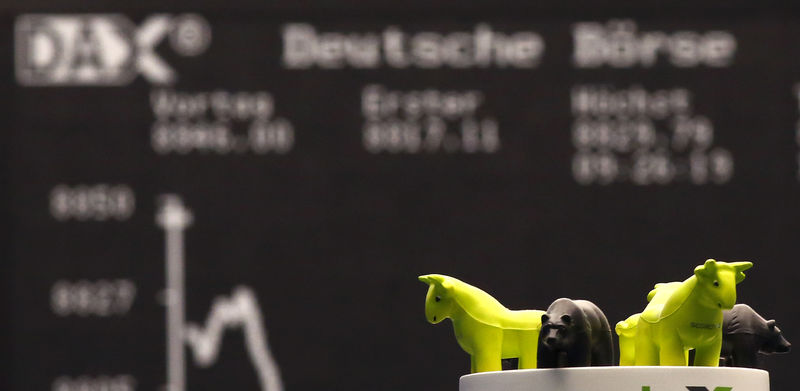This post was originally published on this site
https://i-invdn-com.akamaized.net/news/LYNXNPEEAC0LE_M.jpg
Investing.com – European stock markets are seen opening lower Monday, in cautious trading ahead of a week which sees the start of the U.S. earnings season as well as a deluge of important economic data.
At 3:05 AM ET (0705 GMT), the DAX futures contract in Germany traded 0.4% lower, CAC 40 futures in France dropped 1.2% and the FTSE 100 futures contract in the U.K. fell 0.5%.
The DAX and STOXX 600 have both hit all-time highs in recent weeks as the global economic recovery from Covid-19 continues to pick up the pace. The CAC 40 meanwhile is at a 20-year high.
The U.S. economy, the world’s largest, is at an “inflection point”, U.S. Federal Reserve Chairman Jerome Powell said in an interview on Sunday, with stronger growth and hiring ahead thanks to the vaccine rollout and powerful policy support. However, a resurgence of the virus is still a serious risk, Powell added. U.S. coronavirus cases bottomed nearly a month ago and have edged up steadily since then.
Overnight, India reported a record number of Covid-19 infections, overtaking Brazil to become the second-most affected country globally by the coronavirus.
Back in Europe, beer gardens, restaurants with outdoor eating and the likes of hair salons are set to reopen across England on Monday for the first time in almost four months. By contrast, the Dutch government said a night-time curfew and other restrictions would remain for at least another fortnight as daily infections rose to a two-week high.
Wall Street kicks off its first-quarter earnings season this week, with the banking giants Goldman Sachs (NYSE:GS), JPMorgan (NYSE:JPM) and Wells Fargo (NYSE:WFC) scheduled to report on Wednesday.
Investors will be looking to see if the companies can justify their sky-high valuations. Data from Refinitiv points to S&P 500 firms recording a 25% jump in profit from a year earlier, which would be the strongest performance for the quarter since 2018.
Economic data will also be closely watched this week, with U.S. March inflation and retail sales both seen surging. There will also be a slew of Chinese data released throughout the week, culminating in the closely-watched first-quarter GDP number on Friday, while in Europe the German ZEW economic sentiment indicator is the highlight.
Oil prices drifted lower Monday, with talks between Iran and world powers on resuscitating a 2015 nuclear accord set to continue this week. These discussions could result in the member of the Organization of Petroleum Exporting Countries cartel being allowed once more to supply crude to the global market.
Oil’s strong start to the year has slowed of late as a surge in Covid-19 cases, particularly in Europe, India and Brazil, raised concerns about the outlook for near-term fuel demand. The OPEC+ alliance also agreed to add more barrels from May, and that’s before the Iranian position is confirmed.
U.S. crude futures traded 0.5% lower at $59.03 a barrel, while the Brent contract fell 0.5% to $62.63. Both contracts are down over 9% over the last month.
Elsewhere, gold futures fell 0.3% to $1,739.05/oz, while EUR/USD traded 0.1% lower at 1.1890.

